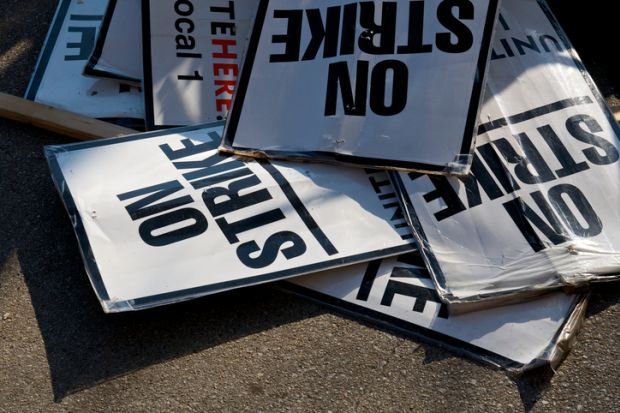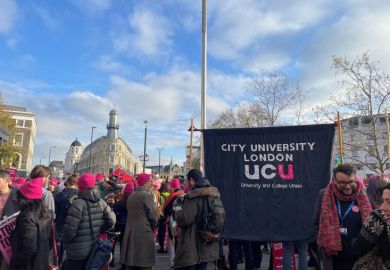The University and College Union described support as “very strong” on the first of 14 days of strike action over changes to the UK’s biggest higher education pension scheme.
Staff at 65 universities walked out on 22 February over plans to scrap the element of the University Superannuation Scheme that guarantees a certain level of pension income in retirement, a move that the UCU claims would leave the typical lecturer almost £10,000 a year worse off in retirement, compared with the current terms.
A UCU spokesman told Times Higher Education that the proportion of staff walking out and joining picket lines was “very strong” despite the cold weather.
“There’s been a really encouraging show from people who haven’t been on the picket line before, as well as students showing solidarity with their lecturers,” he said.
Protesters were also seen entering the Universities UK building in London and putting up banners in the reception area, with some branding it an “occupation” on social media.
Several academics brandishing placards tweeted photos from the picket line, with Nick Bailey, a professor of urban studies at the University of Glasgow, writing: “Fantastic turnout for #ussstrike in Glasgow today. Time to get talks going again.”
Gary Foster, a professor in molecular plant pathology at the University of Bristol, was among those academics striking for the first time. “I’m heartbroken but determined,” he wrote. “I’ve never been on strike before. This time I am, to [the] very end if required.”
Students also took to Twitter to show their support. Lauren Walker, a student at the University of Leeds, wrote: “As a university student, there’s nothing I’m more grateful for than my lecturers so I completely support the #USSstrike because they deserve future financial security just as much as I do with the degree they’re giving me.”
In a statement, UUK insisted that employers “remained at the negotiating table”.
“If a credible, affordable solution were to be put forward by the union, employers would want to consider it,” a UUK spokesman said.
“This industrial action is targeted at students. It will be young people and the next generation of students who will also suffer if their education deteriorates because employers are forced to make cuts to pay more into pensions. Employers are committed to continuing to pay in 18 per cent to staff pensions for the next five years, double the private-sector average.”
Meanwhile, vice-chancellors and politicians have called for a resolution to the dispute.
In a video message posted on Thursday morning, Labour leader Jeremy Corbyn called on university employers to commit to “meaningful negotiations”.
“Downgrading the pension scheme will affect recruitment, retention and, ultimately, our ability to offer world-class higher education,” he said. “Everyone deserves the dignity and security in old age that comes from a decent pension.”
Trevor McMillan, vice-chancellor of Keele University, is the latest sector leader to call for negotiations to be reopened, adding that “the sooner these discussions take place the better the chance that an approach can be found that maintains an attractive scheme within the realms of the financial sustainability of the university system”.
In a message posted on Twitter, Chris Day, vice-chancellor of Newcastle University, said: “I absolutely support staff’s decision to strike – I’m not sure what else they can do to express their concerns about the situation we now find themselves in.”
He added that he and other vice-chancellors were meeting with UUK today and would “urge strongly that negotiations need to recommence”.
Industrial action begins with a two-day walkout on 22 and 23 February, escalating to strikes of three, four and five days in subsequent weeks. The union’s higher education committee is due to meet on 2 March, two weeks into the action, to decide whether further action is required.
More than 1 million students are set to be affected, with about 575,000 teaching hours lost as a result of the strikes, according to union estimates.
Register to continue
Why register?
- Registration is free and only takes a moment
- Once registered, you can read 3 articles a month
- Sign up for our newsletter
Subscribe
Or subscribe for unlimited access to:
- Unlimited access to news, views, insights & reviews
- Digital editions
- Digital access to THE’s university and college rankings analysis
Already registered or a current subscriber? Login








